Stuck with mounting student loan debt after graduation? Wondering how to reduce it and regain control of your finances? Well, look no further! In this article, we’ll delve into practical strategies and actionable steps that can help you tackle your student loan debt head-on. We understand that the burden of student loans can feel overwhelming, but with the right approach, you can make significant progress in reducing your debt and paving the way towards a brighter financial future. So, let’s dive right in and explore some effective ways to reduce student loan debt after graduation.
How to Reduce Student Loan Debt After Graduation
Graduating from college is an exciting milestone, but for many students, it also brings the burden of student loan debt. Fortunately, there are several strategies you can implement to reduce and manage your student loan debt effectively. In this article, we will explore various methods that will help you take control of your finances and alleviate the stress of student loan repayment. From exploring repayment options to seeking loan forgiveness programs, we’ll cover it all. So, let’s dive in!
1. Understand Your Student Loans
The first step in reducing your student loan debt after graduation is to have a clear understanding of the loans you have borrowed. Take the time to gather all the necessary information about your loans, including the type of loans, interest rates, and repayment terms. This will help you make informed decisions about the best strategies to pay off your debt.
Here are some key details to look for:
- Type of Loan: Identify whether you have federal loans, private loans, or a combination of both. Federal loans often come with more flexible repayment options and loan forgiveness programs.
- Interest Rates: Note the interest rates on each loan. Higher interest rates can significantly increase the total amount you will repay over time.
- Repayment Terms: Understand the specific repayment terms for each loan, including the length of the repayment period and whether there is a grace period before repayment begins.
Having a clear understanding of your student loans will help you develop a personalized plan to tackle your debt effectively.
2. Create a Budget
A budget is a powerful tool that can help you take control of your finances and allocate funds towards paying off your student loans. Creating a budget allows you to track your income, expenses, and debt repayment progress. Here’s how to get started:
- Evaluate Your Income: Determine your monthly income from employment, freelance work, or any other sources. This will give you a clear picture of how much money you have available to allocate towards your student loan payments.
- Analyze Your Expenses: Track your monthly expenses, including rent, utilities, groceries, transportation, and any other recurring costs. Look for areas where you can cut back and allocate those savings towards your debt repayment.
- Set Realistic Goals: Based on your income and expenses, set realistic goals for how much you can afford to pay towards your student loans each month. It’s important to strike a balance between aggressive repayment and maintaining a reasonable standard of living.
By creating a budget, you’ll be able to see where your money is going and identify areas where you can make adjustments to accelerate your debt payoff.
3. Explore Repayment Options
If you have federal student loans, you may be eligible for various repayment options that can help lower your monthly payments and make your debt more manageable. Some of the repayment options to consider include:
- Standard Repayment Plan: This plan allows you to make fixed monthly payments over a 10-year period. While it may result in higher monthly payments, it helps you pay off your loans faster and potentially save on interest.
- Income-Driven Repayment Plans: Income-driven repayment plans base your monthly payments on your income and family size. These plans can significantly lower your payments if you have a low income, but they may extend the repayment period and increase the total interest paid.
- Graduated Repayment Plan: This plan starts with lower monthly payments that gradually increase every two years. It’s ideal for borrowers who expect their income to increase over time.
It’s essential to understand the pros and cons of each repayment option and choose the one that aligns with your financial goals and circumstances.
4. Make Extra Payments Whenever Possible
If you have some extra funds available, consider making additional payments towards your student loans. By paying more than the minimum payment each month, you can reduce the principal balance faster and save on interest over time. Here are some strategies to help you make extra payments:
- Create a Debt Repayment Fund: Set up a separate savings account where you can accumulate funds specifically for making extra student loan payments. This way, you can track your progress and visualize your commitment to becoming debt-free.
- Allocate Windfalls Towards Your Loans: Use unexpected financial windfalls, such as tax refunds, work bonuses, or monetary gifts, to make lump-sum payments on your student loans. These extra payments can make a significant impact on reducing your overall debt.
- Consider Biweekly Payments: Instead of making monthly payments, switch to biweekly payments. By doing this, you’ll end up making 26 half-payments, which is equivalent to 13 full payments in a year, helping you pay off your loans faster.
Making extra payments can expedite your debt repayment journey and save you money on interest in the long run.
5. Pursue Loan Forgiveness Programs
Depending on your career path, you may qualify for loan forgiveness programs that can help eliminate a portion or all of your student loan debt. Here are some options to look into:
- Public Service Loan Forgiveness (PSLF): If you work in a qualifying public service job, such as government or non-profit organizations, you may be eligible for loan forgiveness after making 120 qualifying monthly payments.
- Teacher Loan Forgiveness: Teachers who work in low-income schools or educational service agencies may qualify for loan forgiveness of up to $17,500 on their Direct Subsidized and Unsubsidized Loans.
- Loan Forgiveness for Medical Professionals: Some healthcare professions, such as doctors and nurses, may be eligible for loan forgiveness if they work in underserved areas or participate in specific programs.
Research and explore the loan forgiveness programs available in your field of work to see if you meet the requirements. Taking advantage of these programs can significantly reduce your student loan debt.
6. Refinance Your Loans
If you have high-interest private student loans, refinancing could potentially save you money by securing a lower interest rate. When you refinance your loans, you essentially take out a new loan with a private lender to pay off your existing loans. Here are some benefits of refinancing:
- Lower Interest Rates: Refinancing can help you secure a lower interest rate, which means you’ll pay less interest over the life of the loan.
- Consolidation: Refinancing allows you to consolidate multiple loans into one, simplifying your repayment and potentially lowering your monthly payments.
- Improved Repayment Terms: By refinancing, you may be able to extend the repayment period, resulting in lower monthly payments.
Before refinancing, carefully consider the terms and conditions of the new loan, as well as any benefits or protections you may be giving up from your federal loans.
7. Seek Employer Assistance
Some employers offer student loan repayment assistance as part of their employee benefits package. This perk can significantly lighten your debt load. When job hunting or negotiating a job offer, inquire about student loan assistance programs or repayment benefits on offer. These programs may provide monthly contributions towards your student loans, helping you pay off your debt faster.
Additionally, some states and organizations offer loan repayment assistance programs for specific professions or borrowers who commit to working in underserved areas. Research such programs that may be available to you and take advantage of the help offered.
8. Keep Up with Loan Servicer Communications
Staying well-informed about your student loans is crucial in effectively managing your debt. Keep your contact information updated with your loan servicer and ensure you read and respond to any communications promptly. Your loan servicer can provide you with important information about repayment options, potential interest rate changes, or loan forgiveness programs. By staying informed, you can make the best decisions for your financial situation.
Graduating with student loan debt can be overwhelming, but by implementing these strategies, you can take control of your financial future and reduce your debt burden. Start by understanding your loans, creating a budget, and exploring repayment options that align with your goals. Consider making extra payments whenever possible and explore loan forgiveness programs that you may be eligible for. Refinancing your loans and seeking employer assistance are also valuable options to explore. Remember, managing student loan debt takes time, patience, and discipline, but with the right approach, you can successfully reduce your debt and pave the way for a financially secure future.
What Everyone's Getting Wrong About Student Loans
Frequently Asked Questions
Frequently Asked Questions (FAQs)
How can I reduce my student loan debt after graduation?
After graduating, there are various strategies you can employ to reduce your student loan debt. Here are some effective ways:
1. Can I refinance my student loans?
Yes, refinancing your student loans can be a viable option to reduce your debt. By refinancing, you can secure a lower interest rate, potentially saving a significant amount of money over the life of the loan.
2. What is loan consolidation, and should I consider it?
Loan consolidation involves merging multiple student loans into a single loan. Consolidating your loans can simplify your repayment process by combining all your debts into one, potentially lowering your monthly payments.
3. Are there any loan forgiveness programs available?
Yes, there are loan forgiveness programs that can help you reduce or eliminate your student loan debt. These programs are typically available for individuals working in certain professions, such as public service or teaching.
4. Can I make extra payments towards my student loans?
Absolutely! Making extra payments towards your student loans can significantly reduce the overall interest you’ll pay and shorten the repayment period. Consider allocating any extra funds, like bonuses or tax refunds, towards your loan payments.
5. What are income-driven repayment plans, and how do they work?
Income-driven repayment plans base your monthly loan payments on your income and family size. These plans can help make your payments more manageable by adjusting them according to your financial situation.
6. Is it possible to negotiate with my loan servicer for better repayment terms?
Yes, it’s worth reaching out to your loan servicer to explore potential options for better repayment terms. They may be able to offer an extended repayment plan, a lower interest rate, or other alternatives to help reduce your debt burden.
7. Can I seek employment in a qualifying organization to benefit from Public Service Loan Forgiveness (PSLF) program?
Yes, if you work full-time for a qualifying employer, such as a government or nonprofit organization, you may be eligible for the Public Service Loan Forgiveness program. Through this program, your remaining loan balance can be forgiven after making 120 qualifying payments.
8. How can I increase my income to expedite my loan repayment?
There are several ways to boost your income after graduation. You can seek a higher-paying job, take on additional freelance work, or explore side hustles to generate extra income. Applying any additional earnings towards your student loan payments can help you pay off the debt faster.
Final Thoughts
To reduce student loan debt after graduation, there are several strategies you can employ. Firstly, consider making extra payments towards your loans to accelerate the repayment process and reduce the overall interest paid. Secondly, explore loan forgiveness programs, especially if you work in certain public service sectors or professions. Additionally, creating a budget and sticking to it can help you manage your finances more effectively and allocate extra funds towards loan payments. Another option is to refinance your loans to secure a lower interest rate and potentially reduce your monthly payments. By implementing these tactics, you can take proactive steps towards reducing student loan debt after graduation.



